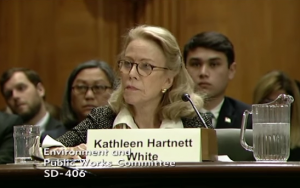January 17, 2018
A New Year….and Old Nominations?
Posted by Timia Crisp
*Update as of 1/18/2018: The nominations of Rep. Jim Bridenstine (R-OK) to be NASA Administrator and AccuWeather CEO Barry Myers to be NOAA Administrator, again cleared the Senate Commerce, Science, and Transportation Committee on party line votes. The nominees will now be voted on by the entire Senate.
2017 was a whirlwind of a year. With a new President came new nominees to be the heads of our federal science agencies. As 2017 ended, some nominees were confirmed – Rear Admirable Tim Gallaudet became the Assistant Secretary of Commerce for Oceans and Atmosphere, Rep. Ryan Zinke became the head of the Department of Interior, and former Governor Rick Perry became the Secretary of Energy. However, not all of President Trump’s nominees were confirmed by the end of the year, which also marked the end of the session, including Rep. Bridenstine (NASA Administrator), Barry Myers (NOAA Administrator), and Kathleen Hartnett-White (Chair of the Council for Environmental Quality).
Under Senate rules, it only takes one objection from a Senator to stop a nomination from being carried over into the new year. At the end of 2017, nearly 90 nominations—an unusually high number – were sent back to the President, including Bridenstine, Myers, and White. At the start of the second session of this Congress, the President could have sent a new list of nominees to the Senate. However, in the case of Bridenstine, Myers, and White, President Trump decided to double down on his choices and re-nominate them.
The nomination of Bridenstine, who faces opposition due past statement challenging the consensus on climate change and politicizing science, will be up for a committee vote on Thursday. He’ll be considered alongside Myers, both of whom have experienced pushback due to their lack of formal science education. Myers also faces opposition by critics who are concerned about potential conflicts of interest. A committee vote for White, who was questioned about her stance regarding climate change at her hearing, has yet to be scheduled. If the nominees are voted favorably in committee, the nominations will still need to be considered by the entire Senate before taking up their positions at their respective agencies.

Kathleen White, senior fellow at Texas Public Policy Foundation, testifying at her nomination hearing (Photo credit: Credit: Senate Environment and Public Works Committee Video)
Confirmation will be even more challenging this session. With the newly elected Senator Doug Jones, who replaced Attorney General Jeff Sessions in a special election, Republicans are barely holding on to the majority. At 51 to 49, Republicans can only lose 2 votes in a confirmation vote, which requires a simple majority.
Adding another layer to the nomination saga, President Trump has filled less positions than his predecessors, according to CNN’s nomination tracker, in large part because he has made fewer nominations. One position in particular, the Director of the Office of Science and Technology Policy (OSTP), has been vacant for the longest time since the office was established in 1976.
As 2018 gears up, nominations will be one of the many issues that Congress will be debating. To keep up-to-date about the status of nominations, sign up for our Science Policy Alerts. Your voice is important now more than ever as we work to inform Congress about the importance of science and the critical role of science in our government.



